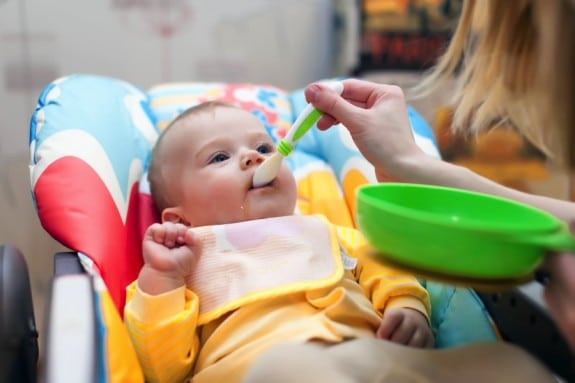For a good 20 years, the American Academy of Pediatrics has advised that parents avoid feeding solid food before babies reach the age of 4 months. That suggestion was revised last year, and parents are now being encouraged to provide nothing except breast milk until the baby reaches six months. When breast milk isn’t an option, formula is considered an acceptable alternative. Unfortunately, the message doesn’t seem to be getting across, the CDC says.
In a national survey of 1,334 mothers, 40 percent said they gave their baby solid foods before the age of 4 months, and 9 percent said they had started as early as 4 weeks. This suggests that either mothers aren’t aware of the recommendations, or they find them too difficult to follow.
Some of the most popular reasons for offering solids included “my baby is old enough,” “my baby seems hungry,” “I wanted my baby to sleep longer at night,” and (the most concerning of all) “a doctor or health care professional said my baby should be eating solid food.”
Economics seemed to play a part in the decision. Young, unmarried, and less educated women seemed turned to solid food more often than other mothers. Poorer women, who tended to view formula as more expensive, also tended to feed solids sooner than those in higher income brackets. Additionally, those that exclusively fed formula or a mix of formula and breast milk were the most likely to say they’d received the go-ahead from their child’s pediatrician.
“Clearly we need better dissemination of the recommendations on solid food introduction,” Kelly Scanlon, an epidemiologist with the CDC, and an author of the study, told NY Times. “Health care providers need to provide clear and accurate guidance, and then provide support to help parents carry out those recommended practices.”
The problem is, that while pediatricians may be sympathetic to the difficulty that parents face in feeding their child only breast milk or formula during that first six months, it’s important that they stand by what they already know . . . little good can come of feeding a baby solids before they are truly ready.
“When a baby is ready to start eating food, he will put his hands in his mouth, and you will see him actually making chewing motions,” Dr. TJ Gold, a pediatrician with Tribeca Pediatrics in Brooklyn, told NY Times. “At three months, they can’t even hold their heads up well and they can’t sit up, making it difficult, if not dangerous to put solid food in their mouth.”
In addition, infants under six months haven’t had the chance to fully develop the diversity of gut bacteria needed to safely process solid food. This can lead to a number of gastrointestinal problems, including diarrhea and gastroenteritis (inflammation of the intestines). And there are studies that have linked the early introduction of solids to problems ranging from obesity and diabetes to eczema and celiac disease.
And those reasons for feeding solids early? They don’t really hold up much when you really take a good look at them. For example, if a parent is turning to a bottle to help a baby sleep at night or gain weight, they might find that, in some ways, they’re actually being counterproductive.
“That big fat bottle at the end of the night isn’t why your baby is sleeping—it’s a skill you acquire,” Dr Gold said. “And if you think giving your child more calories is going to help him gain weight, but it gives him more diarrhea, then he’s not actually absorbing as much.”
In fact, the only one that really holds any serious weight is the cost of formula.
“The formula gets really expensive, especially in the 4-to-6 month window,” Gold said. “and if you have more than one child and you’re already preparing food for the whole family, it’s much easier to just start sweeping things off your plate.”
This issue can be balanced out by encouraging breastfeeding as much and as long as possible, especially for women that are in lower income brackets. This is because, unlike formula, breast milk is supply and demand. As your baby needs more, your body produces more. For help with breastfeeding struggles, seek out help from a lactation consultant or a pediatrician that supports long-term breastfeeding.
https://www.growingyourbaby.com/babies-receive-solids-too-soon/
https://www.growingyourbaby.com/introducing-solid-foods-to-your-infant/
Related Articles:








I didn’t give my daughter anything but breast milk until after 6 months of age. The only allergies she had was milk and eggs, and she outgrew both. I started feeding my son at about 5 months with oats, rice, pureed veggies.But he wasn’t allergic to these. He had many severe food allergies that were noted as soon as I quit breastfeeding him at about I year. He was allergic to 15 of the 18 things tested. He did out grow them by about age 5-6yrs. I only gave them pureed food that I made, and then ground up as they got older. I think some of these allergy issues are just congenital.
The increase in gut problems is because of the increase useof formula. That’s reality!
My grandson is 12 weeks old and putting his fist and fingers in his mouth, chewing/drooling. And even more so when we eat or he sees us eating. So he must be ready for solids as you’ve suggested. Great measuring tool to gage. I had originally anticipated to wait until he was 4 months before trying solids. But your expert advice saves me all the hassle ?
Think my son was the same, definitely sure he did it before 4 months, and he was sat up by 3 months. Load of rubbish, I started baby led weaning about 4 months and he’s fine and now 12 months he can eat most things. He had a couple of spoon fulls of baby rice in his bottles before bed about 3 months and he is fine x
Did you even read the article??????
It’s all just a farce anyway. It’s just this person who wrote the article who’s is just wanting attention, and to make themselves seem relevant.
This is ridiculous! I fed my kids rice cereal when they were about 8 weeks old. By the time they were four months old they were eating mashed potatoes. None of them have food allergies and no other issues either. And I raised 8 of them.
There’s a rise in food allergies because we give or kids processed foods right from the beginning. Formula is filled with preservatives. It’s better than nothing and fed is best, but it’s still filled with preservatives that are horrible on the gut. We also inject them with medications as soon as their born that are filled with preservatives. Preservatives are ruining our guts and brains.
I agree with most of these post. Most of my kids where able to hold there heads up before those mile marker you people so call use. I feed my kids stage 1 baby food or I made them baby food by smashing it up or blending it. From scrambled eggs to green beans and so on. You don’t give your baby a 4 mth old a hot dog only idiots do that. Once your baby is able to hold there own head up and start sucking on there hands or lip with the swallowing sound you can try very small amount of stage 1 baby food or baby cereal make it really liquidy. And just watch how they do if they swallow with no problem then go on it if not hold off. Every child is different. We tried to breastfeed but my wife didn’t lactaid I even went out and bought a pump to pump her and nothing she had some there but not enough we tried for over a month. With all my kids. I believe in breastfeeding my kids I would of loved it for all of them to been feed for over a year.